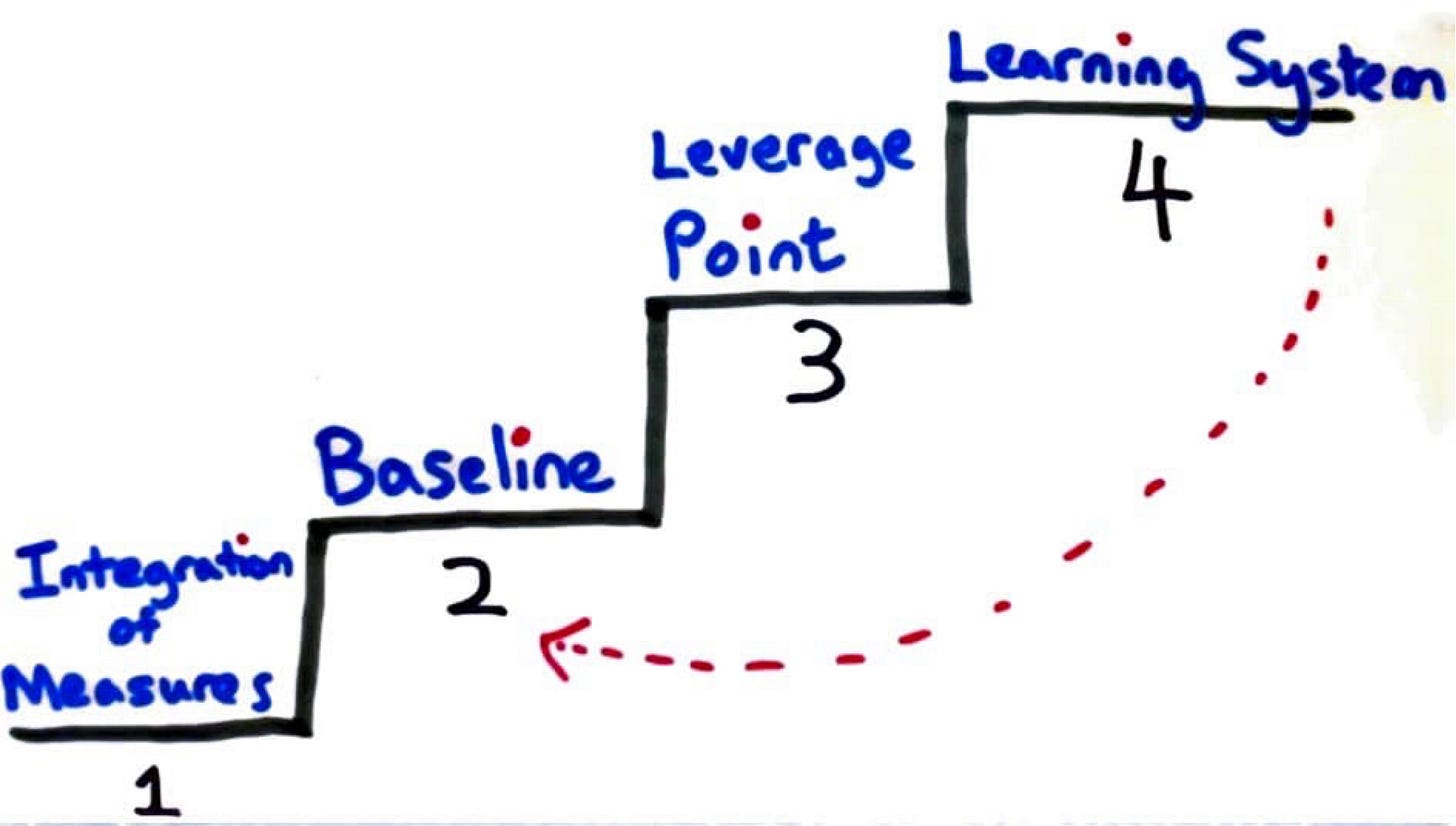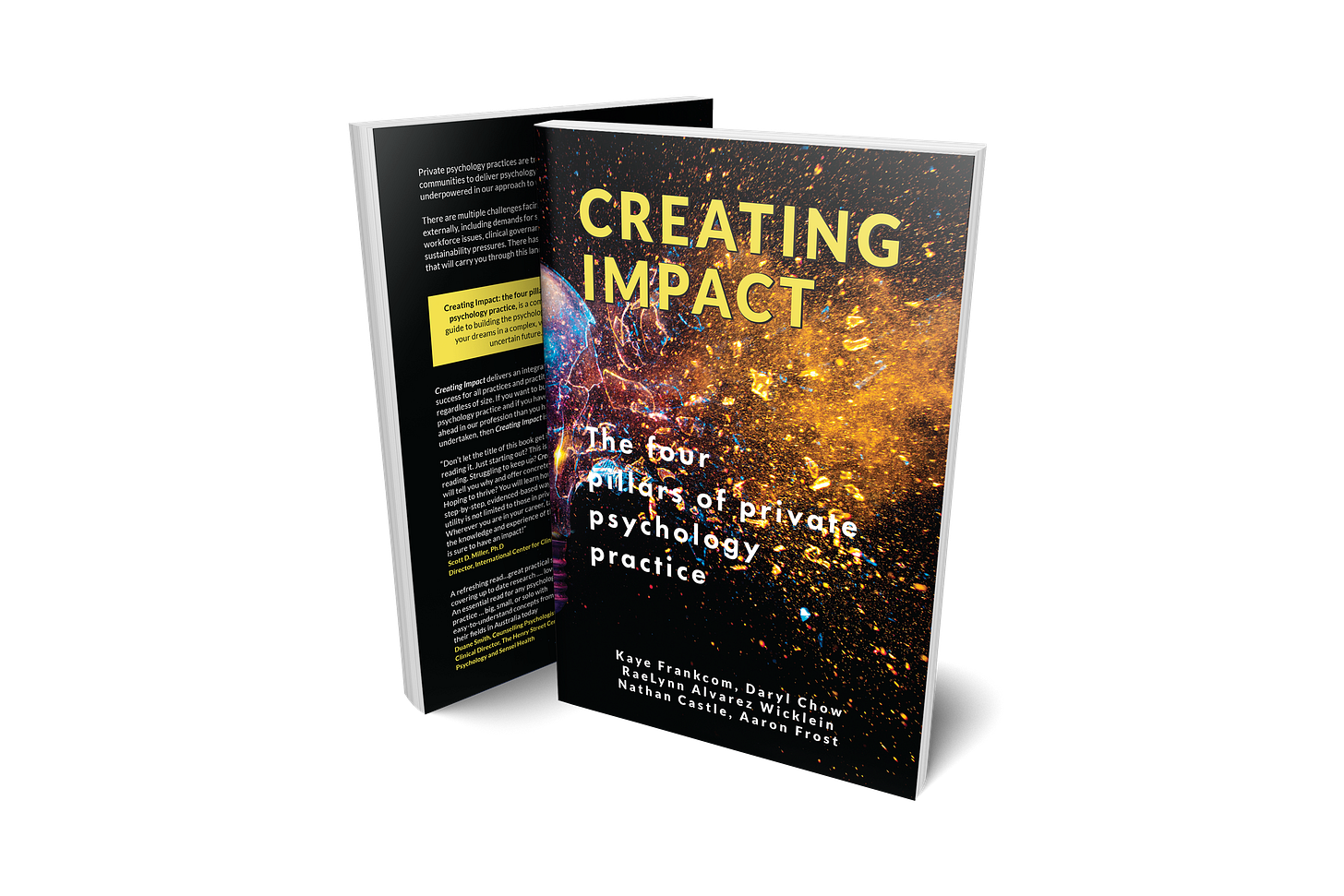Frontiers Friday 120: An Open Dialogue for 2023⭕️
I'm opening up a conversation about where we should go, and I want to hear from you.

Happy New Year.
In today’s missive, I’m taking a leaf out of my favorite music writer’s substack, Ted Gioa’s, The Honest Broker. He’s asking his readers on substack for new year’s advice.
I would like to open up the space to ask you for your thoughts and suggestions on the following:
(If you are reading this on email and would like to comment, open up the link on the top right hand corner, or simply hit the reply comment button)
What do you like more of from Frontiers of Psychotherapist Development (FPD)?
FPD has been going on for about 9 years. It first started off as a blog site, and has since growth into a newsletter, podcast, video, and online courses, etc. Looking back, I was very hesitant to put my thoughts out into the ether. But thankfully, I was heavily encouraged by reading Austin Kleon’s Show Your Work (another fellow creative on Substack), and other guiding figures in my life… plus, I would have felt kinda constipated if I didn’t do it.
Now that we are start of 2023, I want to ask you, dear reader, what sort of specific topics—even if you think it’s off-tangent—that you would like to be addressed?
Also, what sort of format you prefer? Blogposts, audio, video—or all of the above?
Caring for those who care:
I wrote about this about a year and a half ago.
A large part of Frontier’s mission is while you are caring for others, we care for those who care.
Given my contact with practitioners in various settings around the world, I worry that many of us are professionally orphaned.
Many of us, even if you are working in large agency settings, are left to fend and feed for ourselves. It’s disheartening to learn about this experience especially if you just started in the helping profession.
Do you feel professionally orphaned?
Do you have thoughts about how we can address this topic on “caring for those who care?”Confusion about Deliberate Practice
Since the publication of our first study on deliberate practice (20141, 20152), I’ve been getting a constant stream of enquires from practitioners and researchers asking me this.
Some years ago at a conference, when I was presenting our findings relating to deliberate practice in psychotherapy, mid-way through an audience member yelled out a question that is on everybody’s mind, “Daryl, can you just tell us what to practice!”
The evidence we have so far is this: there is no one type of DP activity that you should do. What you need to work on might be different from what I need to work on.
Nobody likes this answer (including me).
Here’s an article I wrote about this in my attempt to explain What Does Deliberate Practice Look Like.
Given the upsurge of interest in this topic in recent years, my colleagues and I are both excited and somewhat cautious about how the idea continues to take shape in our field.
The danger point is this: If we overly-adopt a “gym exercise” view-point about this, we end up hyper-focusing on ourselves and not on the people we are trying to help (I’m having mental images of gym junkies who are three times my size).
Are we sharpening pencils or making good art? The main point of sharpening pencils is to make good art, not just to have sharpened pencils.
In this post The Music of Psychotherapy: Learning in a Wicked Environment, I elaborated further why DP principles that applies to other areas of expertise like sports, chess and classical music is somewhat limited in direct transferability to the field of psychotherapy.
The other caution is this: we might repeat history. You know, you were told to pick a model of therapy that gels with you, and stick to that particular treatment modality and apply that way of working with your clients.
Even though there isn’t a formula to DP, there is a form, a kind of scaffold in order to direct our efforts.
In brief, here’s a visual of 4 critical scaffolds we need for DP:
We wrote a book about using deliberate practice to improve your work, called Better Results3. We even have a follow-up book on this called The Field Guide to Better Results, slated for release on May 2023.
So… here’s my long-winded way of getting to the questions about DP:
- How are you applying DP principles?
- Do you know what to work on to improve your effectiveness as a therapist?Once again, here’s the 3 questions:
1. What do you like more of from Frontiers of Psychotherapist Development (FPD)?
2. Do you feel professionally orphaned? Do you have thoughts about how we can address this topic on “caring for those who care?”
3. How are you applying DP principles? Do you know what to work on to improve your effectiveness as a therapist?
Feel free to answer one or all of them. I would really love to hear your thoughts about this. Thanks in advance.
Side-Conversations on Substack Discussion Threads:
In cased you are interested, here’s a new discussion thread on substack regarding the Reset Effect of New Year.
And here’s the previous discussion on the topic of exploring our biggest challenges in your development (very interested perspectives offered):
Daryl Chow Ph.D. is the author of The First Kiss, co-author of Better Results, and The Write to Recovery, Creating Impact, and the forthcoming book The Field Guide to Better Results.
Footnotes:
Chow, D. (2014). The study of supershrinks: Development and deliberate practices of highly effective psychotherapists[Doctoral dissertation, Curtin University]. https://www.academia.edu/9355521/The_Study_of_Supershrinks_Development_and_Deliberate_Practices_of_Highly_Effective_Psychotherapists_PhD_Dissertation_
Chow, D., Miller, S. D., Seidel, J. A., Kane, R. T., Thornton, J., & Andrews, W. P. (2015). The role of deliberate practice in the development of highly effective psychotherapists. Psychotherapy, 52(3), 337–345. http://dx.doi.org/10.1037/pst0000015
Miller, S. D., Hubble, M., & Chow, D. (2020). Better results: Using deliberate practice to improve therapeutic effectiveness. American Psychological Association.








1. What do you like more of from Frontiers of Psychotherapist Development (FPD)?
I have only been subscribed to FPD for about a year... maybe even less. First off, Thank you. I have been enjoying every aspect of FDP. Audio, written, video, blogs. There is no one format I prefer. They all work for me. I wish I would have found this/your work many many years ago. How do we get this information out to the masses?! :)
2. Do you feel professionally orphaned? Do you have thoughts about how we can address this topic on “caring for those who care?”
Yes, I feel professionally orphaned. I have been fully licensed as psychotherapist for 10+ years and even in graduate school I felt like I had no direction, no understanding of what therapy in the room looked like, no guidance, supervision was dismal and was spent mostly talking about themselves, no real help on finding internships/placements. I have spent most of the last 10 + years trying to figure it out, going to every training possible and still feeling like I have no community and no direction. Each training saying they are the "holy grail" to healing and still not seeing it work for every client. Oh the shame that occurs as a therapist/human feeling like I have done something wrong or I just didn't quite get it right - "You should have been paying more attention." (Direct quote from a consultant/supervisor helping me with a modality I was trained in when it didn't work for a client.) Many times I have felt like I needed to leave the profession. I was so overly worked to death in my last job, high burnout, and little to give to friends and family when I got home, that the only way I saw surviving and staying in this profession was to build a private practice. Now I work all alone but at least I am not burntout, finding balance, and have my life/soul/love/ and joy back. It's sad to say that the only way I survived was to be on my own. I wish it was different in our field. I am not sure how to change this but that's how I have managed. Daryl, I have found your work along with Scott Miller to be refreshing and I have a new found hope that things can be different and that maybe agencies can begin to incorporate professional development and FIT. I think that would be a good step.
3. How are you applying DP principles? Do you know what to work on to improve your effectiveness as a therapist? I am working on the rational of FIT (just began incorporating this in July) and rational for interventions and other aspects of the practice. I was never taught how to provide a rational, bring a client into the process, and collaborate with them in a way that provides good outcomes for them. It feels like a big learning curve but so valuable. I still don't know my exact baseline since I am gathering FIT data but started with something small to see if it does improve effectiveness as a therapist.
I have been following your blog and newsletter for around 1 year and have found it very helpful for my development as a new therapist. Although this is not direct feedback to your question, I really appreciate your focus on client outcomes and therapist development. I think is missing in my training as well as supervision and motivates me to incorporate a deliberate practice system. I have started to incorporate a learning system, and objectives but would like to better integrate this in my workplace and share more about FIT with my supervisor as I do feel "professionally orphaned" at times.